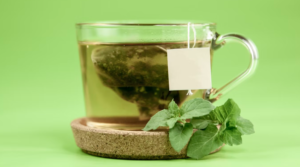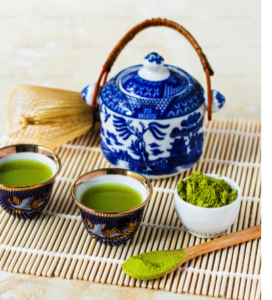Green Tea for Stress Relief – A Natural Antioxidant
Green tea’s been around for centuries, making its first mark in the tea gardens of Asia. It’s not just a drink—it’s part of the culture, cherished for its distinctive flavor and reputed health benefits. In fact, green tea for stress relief is known to go hand in hand. 
Green Tea for Stress Relief
People in China and Japan have been sipping it for ages, not just as a refreshment but as a little herbal remedy packed with history. They know that green tea for stress relief is one of life’s best-kept secrets.
Stress is something we’ve all felt, and these days, it seems more common than ever. It’s that pressure that builds up from daily hassles or major life events. This tension sometimes feel like a never-ending cycle, impacting both our mental and physical health in not-so-great ways.
So, what’s the deal with green tea for stress relief? This ancient brew isn’t just about comfort or culture—it also offers some much-needed relaxation that will relieve tense nerves.
Green Tea Relieves Tense Nerves
It’s believed to help ease those tense nerves, promoting a sense of calm that many of us chase after a long day. There’s a whole chemistry working beneath its soothing vibes, connecting the dots between what we drink and how we feel. However, living a healthy lifestyle goes a long way. There is certainly a science behind green tea, for sure.
The Science Behind Green Tea
L-Theanine is a Key-Player
Green tea isn’t just a warm hug in a cup—it’s science doing its thing with a little help from its active compounds. One key player in green tea’s chill effect is L-theanine, an amino acid that’s been shown to have a calming influence on the brain.
L-theanine promotes relaxation without drowsiness, making it a go-to for those needing to unwind without hitting the sack.
Epigallocatechin in Green Tea Lowers Cortisol
Then, we have catechins, especially epigallocatechin gallate (EGCG). While EGCG often gets the limelight for its antioxidant powers, it also chips in when it comes to reducing stress by potentially lowering levels of stress-related hormones like cortisol. It also activates the neurotransmitters in the brain. 
Green Tea Activates Neurotransmitters
But how does all this chemistry help us feel more zen? Green tea’s compounds affect neurotransmitters in the brain, helping stabilize mood and enhance relaxation.
It’s like giving your brain a gentle nudge toward an exotic antioxidant without the crash that comes from sugary or caffeinated drinks. Today there are many research studies to support these facts.
Research Studies
Research creds? You bet. Multiple scientific studies back green tea’s relaxing credentials. For instance, studies have found that regular consumption of green tea improves specific mood parameters.
This reduces anxiety levels and improves overall psychological well-being. It’s like having science and tradition shaking hands over a cup of tea. Here’s an overview of some notable green tea research from recent years:
1. Cancer Prevention:
Several studies have examined green tea’s potential anti-cancer properties. A 2023 meta-analysis published in the journal “Nutrients” found that regular green tea consumption was associated with a reduced risk of certain cancers, particularly those of the digestive system.
2. Cardiovascular Health:
A large-scale study published in the European Journal of Preventive Cardiology in 2022 suggested that habitual tea drinkers, especially those who preferred green tea, had a lower risk of cardiovascular disease and all-cause mortality.
3. Cognitive Function:
Research from 2023 in the journal “Frontiers in Nutrition” indicated that the compounds in green tea, particularly L-theanine and caffeine, may have positive effects on cognitive function, including improved attention and memory. 
4. Weight Management:
A 2022 systematic review in the “International Journal of Obesity” found that green tea consumption, especially when combined with caffeine, may have a small but significant effect on weight loss and weight maintenance.
5. Diabetes Management:
A study published in 2023 in “Diabetes Care” suggested that regular consumption of green tea may help improve insulin sensitivity and reduce the risk of type 2 diabetes.
6. Oral Health:
Research from 2022 in the “Journal of Dental Research” found that green tea catechins may help reduce dental caries and periodontal disease due to their antimicrobial and anti-inflammatory properties.
7. Skin Health:
A 2023 review in the “Journal of Clinical Medicine” highlighted green tea’s potential benefits for skin health, including protection against UV damage and potential anti-aging effects.
These studies represent some of the more recent research on green tea, but it’s important to note that while many show promising results, more research is often needed to fully understand the effects and optimal use of green tea for health benefits.
So, if you’re looking to ease that spiral of stress, green tea might be a natural, calming choice to explore. It blends ancient wisdom with modern science, giving you a sip of tranquility in the form of those leafy greens. In addition, there are numerous health benefits as well.
Health Benefits of Green Tea
Green tea’s benefits stretch way beyond just calming those frazzled nerves. It’s like nature’s multi-tool when it comes to health. Packed with antioxidants, green tea helps fend off free radicals, those pesky players that cause everything from aging skin to chronic diseases. Green tea also gives your brain a boost.
Green Tea is a Brain Booster
Looking for a brain boost? Green tea’s got you covered there, too. Its magic mix of caffeine and L-theanine not only keeps you alert but also enhances memory and cognitive functions. Think of it as a gentle pick-me-up for your noggin, perfect for when you need a clear mind without the jitters.
Green Tea Supports Heart Health
Sipping on this ancient brew might do wonders for your heart, too. Some studies suggest it helps lower bad cholesterol (LDL) and triglycerides, all the while supporting that crucial cardiovascular system. I know this for a fact in my own life experience with green tea.
My Personal Experience with Green Tea
I’ve been a huge fan of green tea for the past three years, and let me tell you, it has been a game-changer in terms of my overall health.
Firstly, it helps perk me up and sets my day up for success. All it takes is two cups per day: one in the morning and sometimes one in the early afternoon. Green tea not only helps my cognitive function, it also protects my cells. It has also greatly improved my yearly medical lab workup. 
What sealed the deal for me about drinking green tea regularly was when I noticed how improved my yearly laboratory tests were.
According to my primary care physician, all of my blood pressure, glucose, and cholesterol levels (triglycerides, etc.) were exactly where they were supposed to be. Prior lab tests were much higher.
So, for me, this was heart-warming. A sip a day keeps the doctor away (lol). But beyond sipping, there’s more to discover with green tea. It has many health-promoting properties as well.
Green Tea Promotes Holistic Wellness
Beyond just sipping, green tea fits right into a holistic wellness lifestyle. Whether it’s boosting metabolism or helping with weight management, adding green tea to your routine is stacking up little victories for your health.
It’s a faithful companion along the wellness journey, subtly bettering your body one sip at a time. So, incorporating green tea into your daily regime is important. Why not give your lifestyle a boost with Green Tea?
Incorporate Green Tea into Your Daily Routine
Timing matters, folks. To kick off your day with a sense of calm, try starting with a cup of green tea in the morning. It’s a smooth wake-up call that’s got a softer touch than coffee, leaving you refreshed but not jittery.
Heading into the afternoon slump? Another cup helps keep those energy levels up and stress levels down. Just be mindful of the caffeine if you’re winding down your day. You have endless options to choose from.
Choose the Best Green Tea
When it comes to picking your brew, there’s a world of green tea options. Matcha is a concentrated form for those bold flavors and bigger antioxidant punch, while Sencha has a bit of a milder kick. Find the one that suits your taste buds and lifestyle. Learning how to perfect your green tea brew is both an art and a science. 
Brew the Perfect Cup of Tea
Perfecting your green tea brew is all about balance. To unlock its best flavors and benefits, avoid pouring boiling water directly on the leaves. Let it cool a little, aiming for around 160-180 degrees Fahrenheit. Steep for 2-3 minutes, and you’re golden. However, this tea is not just for drinking.
Jazz Up Your Meals
Green tea isn’t just for drinking! It will jazz up your meal times. Think matcha in smoothies or even sprinkled over your morning yogurt. Some folks even swear by green tea-infused skincare for its soothing properties. Next, let’s dive in and see what the experts have to say.
Expert Opinions and Real-Life Experiences
Nutritionists rave about green tea’s versatility. Loaded with benefits, it fits snugly into various wellness plans, thanks to its calming and health-boosting properties.
Experts often recommend it as a tool in stress management strategies, praising its gentle, effective results without unwanted side effects. Plus, the real-life experiences are awe-inspiring.
Real-Life Stories About The Effects of Green Tea
Wellness experts aren’t the only ones talking. Real-life stories add a personal touch. They show how green tea has helped folks handle their stress.
For some, it’s about a ritual—a moment of relaxation in an otherwise crazy day. For others, it’s noticing a tangible boost in their overall mood and well-being. However, it isn’t a magic bullet.
Green Tea Isn’t Some Magic Bullet
It’s essential to keep that in perspective. People sometimes think a cup of tea will solve all their stress woes, but it’s really about integrating it into a balanced lifestyle.
Eating well, staying active, and making time for relaxation all play crucial roles. If you are skeptical, you are not alone.
Questions About Green Tea
Got questions? You’re not alone. A lot of folks wonder about things like the best type of green tea for stress or if decaf green tea offers the same benefits. 
Here’s the scoop: Decaf versions still have some of those goodness-packed compounds, albeit in smaller amounts. As for the best type, it largely depends on personal preference and how your body reacts.
Special Links:
OMRON Silver Blood Pressure Monitor
Uncle Lee’s Organic Tea
Final Thoughts
So, next time stress starts creeping in, remember there’s a humble hero in a cup of green tea waiting to lend a hand. It’s about embracing this ancient drink and making it a small yet impactful part of your day-to-day routine. Make sure you engage in something that brings you joy: go on a cruise, a walk in the park, a movie, a fine-dining restaurant, a concert, or buy yourself a new outfit. Let your hair down.
Founder and Content Creator
(w) mybluegenes.com
(e)rachele@mybluegenes.com





Your blog is a treasure trove of valuable insights and thought-provoking commentary. Your dedication to your craft is evident in every word you write. Keep up the fantastic work!
Thank you for your patronage. Really appreciate it.
Rachele
I got what you mean ,saved to favorites, very decent site.
Hi there, my friend.
Glad to hear this and Happy New Year!
Rachele
WONDERFUL Post.thanks for share..extra wait .. …